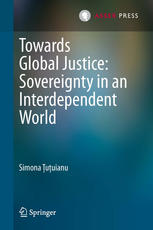

Most ebook files are in PDF format, so you can easily read them using various software such as Foxit Reader or directly on the Google Chrome browser.
Some ebook files are released by publishers in other formats such as .awz, .mobi, .epub, .fb2, etc. You may need to install specific software to read these formats on mobile/PC, such as Calibre.
Please read the tutorial at this link. https://ebooknice.com/page/post?id=faq
We offer FREE conversion to the popular formats you request; however, this may take some time. Therefore, right after payment, please email us, and we will try to provide the service as quickly as possible.
For some exceptional file formats or broken links (if any), please refrain from opening any disputes. Instead, email us first, and we will try to assist within a maximum of 6 hours.
EbookNice Team

Status:
Available0.0
0 reviewsWith Forewords by Geoffrey Robertson QC, Doughty Street Chambers, London, UK and Professor Mihail E. Ionescu, Bucharest, Romania
Simona Ţuţuianu describes a new model of sovereignty which is fast replacing the traditional Westphalian model embodied in Article 2 of the UN Charter and rigorously followed throughout the Cold War. The scholarly basis for this new model draws upon developments in international criminal law which first emerged from the Nuremberg trials and upon more recent interstate economic cooperation which has turned sovereign independence into interdependence across a range of state functions. Does this mean that traditional Westphalian concepts of sovereignty should be abandoned in constructing a new theory of world governance for the twenty-first century? Not at all. A new model, which can be called the pattern of interdependence-based sovereignty, serves to explain contemporary events that puzzle traditional theorists, such as the war over Kosovo, the invasions of Iraq and Libya, the emergence of a “Responsibility to protect” doctrine and its recent validation in Security Council Resolutions 1970 and 1973. We are witnessing the emergence of a new philosophy of action, which is in the process of producing a 21st century system of international relations.
The Book will appeal to academics, students and postgraduates studying international affairs, politics, international law, diplomatic history, or war and/or peace studies. It is particularly of interest for NATO establishments and national military schools, while experts and scholars will value its theory of what sovereignty means today.
The Book offers a multidisciplinary approach which underpins a new theory of how human rights can be better protected in a better world. There is a unique case study of cooperative security in the Greater Black Sea Area, by one of the few experts on the politics of this region.It will be read and appreciated by those who need to understand how modern international law